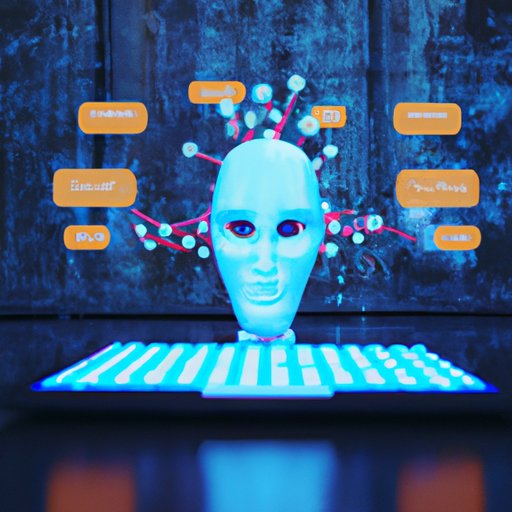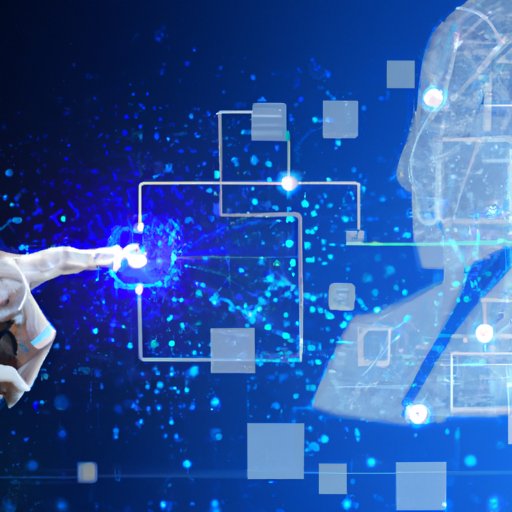Introduction
As technology advances, so does the need for improved security measures to protect against cyber threats. Artificial intelligence (AI) has been identified as a promising tool for improving cyber security and minimizing the risk of cyber attacks. This article examines the potential implications of using AI in cyber security and investigates whether AI is capable of taking over cyber security.
Examining the Role of Artificial Intelligence in Cyber Security
AI is increasingly being used to improve cyber security. AI-powered solutions can detect malicious activity more quickly and accurately than traditional methods, enabling organizations to respond faster to threats. AI can also be used to automate many security tasks, such as identifying suspicious behavior and responding to incidents, freeing up resources that would otherwise be devoted to manual processes.
There are several types of AI used for cyber security, including machine learning, deep learning, natural language processing, and computer vision. Machine learning algorithms are used to analyze large data sets to identify patterns and anomalies, while deep learning systems use neural networks to learn from data and recognize patterns. Natural language processing enables machines to understand and process human language, while computer vision enables machines to “see” and interpret images.
Using AI for cyber security offers a number of potential benefits, including improved threat detection, improved response times, and reduced costs. However, it also presents some challenges. For example, AI systems can be vulnerable to manipulation and bias, and may require significant amounts of data to train. Additionally, AI systems can be expensive and require specialized expertise to develop and maintain.
Exploring the Potential for Automated Cyber Security with AI
Automating cyber security with AI can provide a number of advantages. Automation can reduce the workload of security personnel, freeing up time and resources that can be devoted to other tasks. Automation can also improve accuracy, as AI-powered solutions can detect threats more quickly and accurately than humans. Additionally, automation can help organizations keep up with the ever-evolving cyber threat landscape, as AI systems can be trained to quickly adapt to new threats.
However, there are also some challenges associated with automating cyber security with AI. For example, AI systems can be vulnerable to manipulation and bias, which can lead to false positives or false negatives. Additionally, AI systems require significant amounts of data to train, and they may be unable to detect certain types of threats.

Comparing Human and Machine Intelligence for Cyber Security
When it comes to cyber security, both human and machine intelligence have their advantages. Humans have the advantage of intuition, creativity, and problem-solving skills, which allow them to think outside the box and come up with innovative solutions. Machines, on the other hand, have the advantage of speed and accuracy, as they can process vast amounts of data quickly and accurately.
Humans also have the advantage of being able to adapt quickly to changing environments and evolving threats. Machines, however, are limited by the data they are given, meaning they may not be able to detect new or unknown threats. Additionally, machines may be unable to identify subtle clues or anomalies that humans may be able to detect.

Assessing the Feasibility of AI Taking Over Cyber Security
Although AI has the potential to improve cyber security, it is still limited in its ability to fully take over cyber security. AI systems require significant amounts of data to train, and they may be unable to detect certain types of threats. Additionally, AI systems can be vulnerable to manipulation and bias, which can lead to false positives or false negatives. As such, it is unlikely that AI will be able to completely take over cyber security in the foreseeable future.

Evaluating the Benefits and Risks of AI in Cyber Security
AI offers a number of potential benefits for cyber security, including improved detection, improved response times, and reduced costs. However, AI also presents some risks, including the potential for manipulation and bias, as well as the inability to detect certain types of threats. As such, organizations must carefully evaluate the benefits and risks of using AI for cyber security before implementing any AI-powered solutions.
Analyzing the Impact of AI on Cyber Security Practices
AI is likely to have a significant impact on existing cyber security practices. For example, AI-powered solutions can automate many security tasks, such as identifying suspicious behavior and responding to incidents, freeing up resources that would otherwise be devoted to manual processes. Additionally, AI can enable organizations to detect and respond to threats more quickly, allowing them to stay ahead of the ever-evolving cyber threat landscape.
AI may also enable organizations to adopt new cyber security practices, such as automated incident response, predictive analytics, and AI-assisted malware analysis. These new practices can help organizations stay ahead of cyber threats and minimize the risk of an attack.

Investigating How AI Could Transform Cyber Security
The increasing use of AI in cyber security could have far-reaching implications for cyber security professionals. AI-powered solutions can automate many of the tasks currently performed by humans, freeing up resources that can be devoted to higher-level activities. Additionally, AI can help organizations stay ahead of the ever-evolving cyber threat landscape, allowing them to better protect their data and systems.
In the future, AI may enable organizations to develop more sophisticated cyber security strategies, such as automated incident response and predictive analytics. Additionally, AI may enable new methods of authentication and access control, such as facial recognition and voice recognition. Ultimately, AI could transform the way organizations approach cyber security, allowing them to more effectively protect their data and systems from cyber threats.
Conclusion
AI has the potential to significantly improve cyber security, but it is still limited in its ability to fully take over cyber security. Organizations must carefully evaluate the benefits and risks of using AI for cyber security before implementing any AI-powered solutions. AI can automate many security tasks, enable organizations to detect and respond to threats more quickly, and enable organizations to adopt new cyber security practices. In the future, AI may enable organizations to develop more sophisticated cyber security strategies and enable new methods of authentication and access control. Ultimately, AI could transform the way organizations approach cyber security, allowing them to more effectively protect their data and systems from cyber threats.
In conclusion, AI holds great promise for improving cyber security, but organizations must carefully consider the risks and rewards before implementing any AI-powered solutions. Additionally, organizations should be aware of the potential implications of using AI for cyber security, as it could have a significant impact on existing practices and enable new methods of protection.
(Note: Is this article not meeting your expectations? Do you have knowledge or insights to share? Unlock new opportunities and expand your reach by joining our authors team. Click Registration to join us and share your expertise with our readers.)
